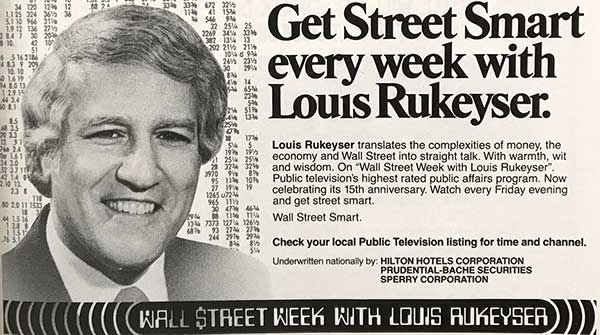Could a Canadian version of Wall Street Week be the next big thing?
 A couple of weeks ago, I’d finished writing a piece late into the evening. I’ve always been a bit of a night owl, so that’s nothing new for me. My wife and son were already asleep – a wise move on their part. I decided to head to YouTube and find some enjoyable television and music clips before turning in.
A couple of weeks ago, I’d finished writing a piece late into the evening. I’ve always been a bit of a night owl, so that’s nothing new for me. My wife and son were already asleep – a wise move on their part. I decided to head to YouTube and find some enjoyable television and music clips before turning in.
Within a few minutes, I came across a video containing an old episode of Wall Street Week with Louis Rukeyser. It was a 30-year retrospective of the venerable program that was originally broadcast on Nov. 3, 2000. I remember watching the program, but I have no recollection of the gala event that preceded it.
I was immediately engrossed. My plans for getting some shut-eye at a semi-decent hour had been left at the Sandman’s front door – again!
 |
| More in Television |
| The mystery of Doctor Who
|
| When Mister Rogers met Mr. Dressup
|
| Murdoch Mysteries – then and now
|
All kidding aside, I’m sure many people remember Rukeyser’s version of Wall Street Week with fondness. The program was launched on PBS on Nov. 20, 1970, and produced by Maryland Public Television. The inaugural host was Rukeyser. The son of author and longtime financial journalist Merryle Rukeyser, he was a former political/foreign correspondent at the Baltimore Sun and then worked as an ABC News economics correspondent/commentator and syndicated columnist.
In many ways, Rukeyser seemed like a natural fit for this role.
He was an “exquisitely tailored and pun-loving television host who helped millions of Americans believe that they could get rich in the stock market, or at least begin to understand it,” James Grant wrote in a New York Times obituary on May 3, 2006. Rukeyser portrayed himself as a “self-described champion of the ‘little guy’ and could be “openly contemptuous of professional investors, a sentiment many of them warmly reciprocated.” Indeed, he often “reserved his most withering scorn for the ‘gloomy Guses’ and ‘Wrong-Way Corrigans’ who warned of financial troubles that, during the prosperous 1990s, never transpired.”
Grant also referred to a comment made by Rukeyser in 1980, “I invented the job of economic commentary on television.” His success with Wall Street Week was unheard of. The weekly show attracted “the biggest audience on public television” and made him “a celebrity in the improbable field of light-hearted, free-market-oriented financial commentary.”
It’s a valid point. There had been no such thing as a weekly economic commentator on television before his arrival. I strongly doubt it had ever been seriously considered, either. The fairly mundane topics of business and finance wouldn’t naturally attract a significant audience outside this profession. Most would have wanted serious commentary with hard numbers, statistics and graphs. To build a non-business-related audience, some or all of this serious content had to be presented more broadly and contain light humour and amusing anecdotes to keep viewers engaged. With the exception of a few avenues, such as business cartoons that have appeared in Barron’s and the Wall Street Journal, that’s a pretty tall order.
Yet, Rukeyser accomplished just this on Wall Street Week for an astonishing 32 years.
He proved there wasn’t just one model for television when it came to economic commentary. The world of business could also appeal to the layman. Rukeyser employed popular techniques such as short commentaries on financial matters and market trends, panel discussions with financial gurus like Frank Cappiello, Michael Holland and Julius Westheimer, and interviewed prominent names in business and politics like Alan Greenspan, Ross Perot, Malcolm Forbes – and, in one of the show’s most popular segments, his father.
There was also its memorable theme, “TWX In 12 Bars.” It’s the only song ever made with percussion instruments and a teletype machine!
When PBS unceremoniously dumped Rukeyser in 2002, he moved to CNBC and started Louis Rukeyser’s Wall Street – named after one of his newsletters, as it happens. The show had a decent two-year run until Rukeyser asked for it to be stopped. His health issues, including multiple myeloma, had caught up with him.
Wall Street Week with Fortune, the replacement show hosted by business analysts Geoff Colvin and Karen Gibbs, was cancelled in 2005. It returned a decade later in different forms. The program has been hosted by businessman and short-lived White House Communications Director Anthony Scaramucci and financial advisor Gary Kaminsky (2015-16), Fox Business host Maria Bartiromo (2017) and, after a multi-year absence, returned as Bloomberg Wall Street Week in 2020 with current host David Westin.
Rukeyser’s success hasn’t been replicated to date. It’s a hard act to follow.
Could a Canadian version of this show be launched? There’s no reason why not.
The logical name would be Bay Street Week. A similar format to Wall Street Week could be devised, or they could create something different. Maybe they could license the original theme song and include Canadian-style sounds from our vast wilderness. Who would the hosts be? Business journalist Amanda Lang would be a good choice. Lang’s old sparring partner, businessman and political gadfly Kevin O’Leary, would certainly fit the bill. Businessman/philanthropist Rudyard Griffiths could work, or even a Canadian business columnist like Terry Corcoran and Peter Foster.
Would the proposed Bay Street Week be successful? That’s hard to say. The Gloomy Guses and Wrong-Way Corrigans that Rukeyser immortalized for decades could ultimately decide its fate.
Michael Taube, a Troy Media syndicated columnist and Washington Times contributor, was a speechwriter for former Prime Minister Stephen Harper. He holds a master’s degree in comparative politics from the London School of Economics.
For interview requests, click here.
The opinions expressed by our columnists and contributors are theirs alone and do not inherently or expressly reflect the views of our publication.
© Troy Media
Troy Media is an editorial content provider to media outlets and its own hosted community news outlets across Canada.

